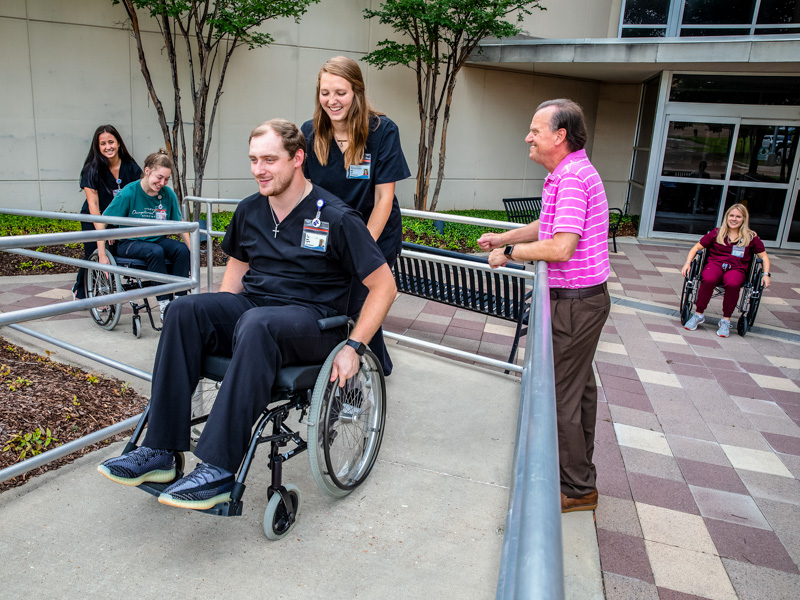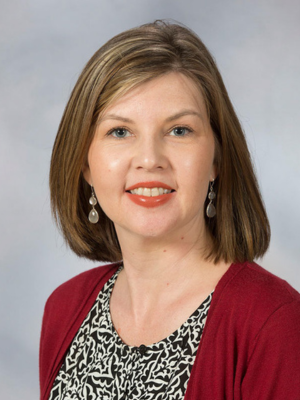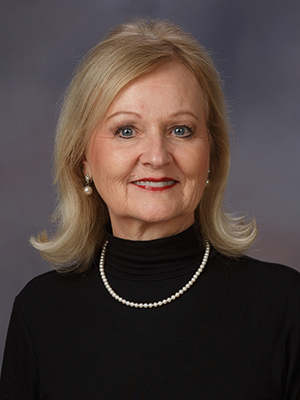Sky’s the limit for SHRP’s first OTD graduates

The University of Mississippi Medical Center has produced its first doctor of occupational therapy class – and the career possibilities for those health care professionals are more exciting and service-oriented than some might expect.

“We’re the only program in the state providing an occupational therapy degree, so we hold ourselves and students to a high educational standard,” said Dr. Christy Morgan, professor and chair of the Department of Occupational Therapy in the School of Health Related Professions. “The majority of those providing occupational therapy services in the state are UMMC graduates.”
Occupational therapy degrees at SHRP have evolved, beginning with a bachelor’s degree program in 1991, transitioning to a master’s program in 2006, and now solely the doctoral degree. SHRP was granted full accreditation for its new Doctor of Occupational Therapy program in December 2020. The 32 members of the May 2021 OTD class wore graduation hoods of slate blue, a color designated by the American Occupational Therapy Association.
The main educational difference between a master’s OT program and a doctoral program is the depth into which some topics are explored. Not only do the doctoral students continue to learn entry-level patient care, but they are also challenged to delve more deeply into concepts related to leadership, management, specialty practice areas and scholarly activities. Students also complete what’s called a “capstone experience,” a 14-week advanced, hands-on experience with a mentor in a clinic or community setting. It builds leaders who emerge from the program ready to explore both traditional and non-traditional OT settings.

“The master’s program has long required students complete 24 weeks of fieldwork education,” Morgan said. “But as we transition to the doctoral degree, students will still have to do the 24 weeks of fieldwork, but add an additional 14 weeks of advanced experience in a designated area.”
That capstone experience can take place via one of four different pathways, or treks: research and education, clinical specialty, administration and leadership, and community health. They have aspects in common, but all lend themselves to unique individualized experiences. Each student chooses a capstone trek that corresponds to their interests, said Dr. Penny Rogers, professor of occupational therapy and the doctoral program’s capstone coordinator.

“Some students say they want clinical (fieldwork) because that’s all they know. I have to be a salesperson and tell them why it’s important to explore other roles relevant to OT. We want our OTD graduates to know they are the change agents,” Rogers said.
She offered an example. “Say a student wanted to start a residential group home for teens with traumatic brain injuries (TBI) who want to live on their own. I’d send that student to a community site for patients where the OT student can utilize their skills. After a capstone experience like that, they have the foundation to one day start their own nonprofit.”
“Some of our previous graduates were going straight into administrative or managerial roles as fairly new graduates. The capstone will give them essential experiences in management before ever being employed into those roles,” Morgan said.
“We prepare students to think outside of the box, and not to limit themselves to a medical model. There’s so much we can do in a community that’s not limited to a hospital or outpatient-based setting,” Morgan said. “They are having to be an ambassador for our profession and see the potential in their skills. For example, we have two capstone students in New York who are integrated into the community in the Bronx, helping children with developmental milestones.
“Ultimately, OTD students must return to campus and explain a culminating capstone project that was created for their assigned site and how they synthesized their experience,” Morgan said. “That is the marker of the completion of the doctoral degree.”
Top of mind for the doctoral students is how their studies and experiences relate to giving their patients the care that restores or improves as much quality of life as possible.
Rogers recalled a patient with neurological challenges who wanted badly to be able to feed himself. It took a lot of hard work with his occupational therapist, but the patient was delighted when he was finally able to guide a spoon of mashed potatoes to his mouth.
“We get to see the victory with our clients and patients that other disciplines might not get to see,” Rogers said.

That has been one of the experiences of Elizabeth “Bubba” Bridges, a May 2021 OTD graduate. She performed her capstone project at the Little Lighthouse of Central Mississippi, a tuition-free development center in Jackson for children diagnosed with developmental delays resulting from physically or mentally challenging conditions.
While her capstone project at Little Lighthouse mainly involved management and development efforts, Bridges also completed hands-on occupational therapy work with children. The overall experience was more of a learning curve than she’d expected, said Bridges, who will begin work at Little Lighthouse in August after passing her boards.
“I picked up a lot of skills that, in a pinch, I can definitely go back into the office and use to work with fundraising. If they need someone to put numbers into the system, I can do that quickly,” she said. “Someone else, they’d have to train. I’ll serve as that person as they need it. I had no idea that I’d be getting into that, let alone be interested.”
Bridges “gets to see what the clinicians do, and she’s understanding the role of administration and how to raise funds for a nonprofit,” Rogers said. “We give students the best of both worlds. They are growing skills beyond anything they would have imagined they’d be doing.”
When one of the Little Lighthouse volunteers told Bridges that she was interested in the doctoral OT program, Bridges gave her some advice. “Make some observations. Go around and watch other people and how their therapy goes,” she said. “If it inspires you and you can see yourself doing it for the rest of your life, it’s a great profession.
“The UMMC program is excellent, and the faculty and staff are so encouraging and make every effort to make it a good experience,” she said. “It’s hard work, but that’s not all it is.”


